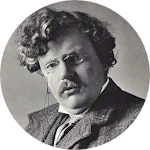Introductory Note:
The Book of Job is not known for eliciting chuckles, but one would have a difficult time reading this introduction to Job from G.K. Chesterton without cracking a grin or two. The key is that Chesterton knows that the inherent absurdity of Job’s wrestlings with God is part of the universal human condition, and he treats it with a warm, expansive spirit that says, “Ah yes, and I’ve been there, too.”
So, here is a piece for you, if you’ve been there, too. A little wisdom from GKC, mixed with the great Wisdom of Scriptures, amounts to an inspired consideration of suffering, righteousness, and the unfathomable wonder of God.
Renovaré Team
The present importance of the Book of Job cannot be expressed adequately even by saying that it is the most interesting of ancient books. We may almost say of the Book of Job that it is the most interesting of modern books. In truth, of course, neither of the two phrases covers the matter, because fundamental human religion and fundamental human irreligion are both at once old and new; philosophy is either eternal or it is not philosophy. The modern habit of saying, “This is my opinion, but I may be wrong,” is entirely irrational. If I say that it may be wrong I say that is not my opinion. The modern habit of saying “Every man has a different philosophy; this is my philosophy and its suits me”; the habit of saying this is mere weak-mindedness. A cosmic philosophy is not constructed to fit a man; a cosmic philosophy is constructed to fit a cosmos. A man can no more possess a private religion than he can possess a private sun and moon.
The first of the intellectual beauties of the Book of Job is that it is all concerned with this desire to know the actuality; the desire to know what is, and not merely what seems. If moderns were writing the book we should probably find that Job and his comforters got on quite well together by the simple operation of referring their differences to what is called the temperament, saying that the comforters were by nature “optimists” and Job by nature a “pessimist.” And they would be quite comfortable, as people can often be, for some time at least, by agreeing to say what is obviously untrue. For if the word “pessimist” means anything at all, then emphatically Job is not a pessimist. His case alone is sufficient to refute the modern absurdity of referring everything to physical temperament. Job does not in any sense look at life in a gloomy way. If wishing to be happy and being quite ready to be happy constitute an optimist, Job is an optimist. He is a perplexed optimist; he is an exasperated optimist; he is an outraged and insulted optimist. He wishes the universe to justify itself, not because he wishes it to be caught out, but because he really wishes it to be justified. He demands an explanation from God, but he does not do it at all in the spirit in which Hampden might demand an explanation from Charles I. He does it in the spirit in which a wife might demand an explanation from her husband whom she really respected. He remonstrates with his Maker because he is proud of his Maker. He even speaks of the Almighty as his enemy, but he never doubts, at the back of his mind, that his enemy has some kind of a case which he does not understand. In a fine and famous blasphemy he says, “Oh, that mine adversary had written a book!” It never really occurs to him that it could possibly be a bad book. He is anxious to be convinced, that is, he thinks that God could convince him.
In short, we may say again that if the word optimist means any thing (which I doubt) Job is an optimist. He shakes the pillars of the world and strikes insanely at the heavens; he lashes the stars, but it is not to silence them; it is to make them speak. In the same way we may speak of the official optimists, the Comforters of Job. Again, if the word pessimist means anything (which I doubt) the comforters of Job may be called pessimists rather than optimists. All that they really believe is not that God is good but that God is so strong that it is much more judicious to call Him good. It would be the exaggeration of censure to call them evolutionists; but they have something of the vital error of the evolutionary optimist. They will keep on saying that everything in the universe fits into everything else: as if there were anything comforting about a number of nasty things all fitting into each other. We shall see later how God in the great climax of the poem turns this particular argument altogether upside down.
When, at the end of the poem, God enters (somewhat abruptly), is struck the sudden and splendid note which makes the thing as great as it is. All the human beings through the story, and Job especially, have been asking questions of God. A more trivial poet would have made God enter in some sense or other in order to answer the questions. By a touch truly to be called inspired, when God enters, it is to ask a number more questions on His own account. In this drama of skepticism God Himself takes up the role of skeptic. He does what all the great voices defending religion have always done. He does, for instance, what Socrates did. He turns rationalism against itself. He seems to say that if it comes to asking questions, He can ask some questions which will fling down and flatten out all conceivable human questioners.
The poet by an exquisite intuition has made God ironically accept a kind of controversial equality with His accusers. He is willing to regard it as if it were a fair intellectual duel: “Gird up now thy loins like a man; for I will demand of thee, and answer thou me.” The everlasting adopts an enormous and sardonic humility. He is quite willing to be prosecuted. He only asks for the right which every prosecuted person possesses; He asks to be allowed to cross-examine the witness for the prosecution. And He carries yet further the correctness of the legal parallel. For the first question, essentially speaking, which He asks of Job is the question that any criminal accused by Job would be most entitled to ask. He asks Job who he is. And Job, being a man of candid intellect, takes a little time to consider, and comes to the conclusion that he does not know.
From The Introduction to the Book of Job (1916); public domain, via A Solemn Charge.


